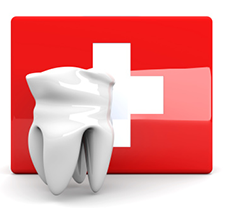Common Teeth Crises
 Dental nightmares can come true, as much as you hope it doesn’t happen to you! If you’re lucky, a quick call to the dentist can get you seen immediately, but what happens if disaster strikes when the office is closed, you’re traveling, or some other less than ideal scenario? Find out how you can help manage the situation until you get the professional care you need.
Dental nightmares can come true, as much as you hope it doesn’t happen to you! If you’re lucky, a quick call to the dentist can get you seen immediately, but what happens if disaster strikes when the office is closed, you’re traveling, or some other less than ideal scenario? Find out how you can help manage the situation until you get the professional care you need.
What to Do If…
You have a fractured or broken tooth:
First, check your tooth to assess the level of damage. Often, chipping or light cracking — which are typically minor and require minimal treatment, if any — can be confused with more serious tooth damage. But should you find that the crack looks deep, or your tooth has broken into pieces, you may be at risk for an infection and tooth loss. Using warm water, rinse the area clean, and apply a cold compress if you notice any facial swelling. See your dentist as soon as you can.
Your tooth gets knocked out:
No ifs, ands or buts about it — having a tooth dislodged qualifies as an emergency. Time is of the essence when it comes to your chances of saving the tooth, so contact your dentist immediately. To help protect the tooth until you get to the office, rinse it very gently in water, taking care to avoid touching the root. If possible, try to keep the tooth in its original place by gently biting on gauze or a tea bag or under your tongues. Otherwise, place the tooth in a little bit of milk to help preserve it. Never store the tooth in water.
You have a severe toothache:
Even the mildest and most fleeting of toothaches shouldn’t be overlooked, but extremely painful and persistent cases need immediate attention and could be a sign of an exposed nerve or tooth infection. To avoid aggravating the tooth any further, clear the problem area of food particles as best as you can by flossing gently and rinsing with warm water.
Your braces come loose:
It may not sound so dire, but braces that come undone can be more than just aggravating. The wires are sharp enough to get stuck in your sensitive cheeks, gum and mouth if they come free. Avoid getting poked by covering the pointed end with cotton, gauze or beeswax. Try not to pull on the wire to avoid further complications.
You get something stuck between your teeth:
Using your teeth to rip open packaging or chewing on a pen or pencil (all of which are dental no-no’s) can cause small objects to get wedged between your teeth. While it may cause discomfort, don’t reach for something sharp to dislodge it — doing so could damage your enamel and gums. Try flossing it out instead. In the event that does not work, play it safe and have your dentist remove it.
Preventative Care and Other Precautionary Measures
As dreadful as these dental emergencies sound, it’s simple to help safeguard your smile from such problems. To minimize the chance of oral trauma from occurring, follow these safety tips:
- Wear a mouth guard when playing sports or engaging in extremely physical activities
- Avoid eating overly hard foods, and cut food into bite-size pieces when possible
- Use scissors to open bags or boxes, not your teeth
- Keep objects out of your mouth, or try sugar-free gum if you have an urge to chew
Seeing your dentist regularly is also critical to detecting and treating minor problems before they become worse. Get a checkup at least every six months or as advised by your dentist.
Sources:
Dental Emergency Procedures Can Help Save a Tooth. (n.d.). Retrieved June 1, 2015 from http://www.colgate.com/app/CP/US/EN/OC/Information/Articles/Oral-and-Dental-Health-Basics/Dental-Emergencies/Dental-Emergencies/article/Dental-Emergency-Procedures-Can-Help-Save-a-Tooth.cvsp
Fractured and Broken Teeth. (2012, April 30). Retrieved June 1, 2015 from http://www.colgate.com/app/CP/US/EN/OC/Information/Articles/Oral-and-Dental-Health-Basics/Dental-Emergencies/Dental-Emergencies/article/Fractured-and-Broken-Teeth.cvsp?cid=ppc_gg_nb_stan_awareness+-+dental+emergencies_broad&kw=dental+emergencies&gclid=CPuk4I6A58UCFZY2aQod6l8AvA
How to Handle Common Dental Emergencies. (2008). Retrieved June 1, 2015 from http://www.deltadentalco.com/uploadedFiles/Wellness/DentalEmergencies040513_web.pdf

